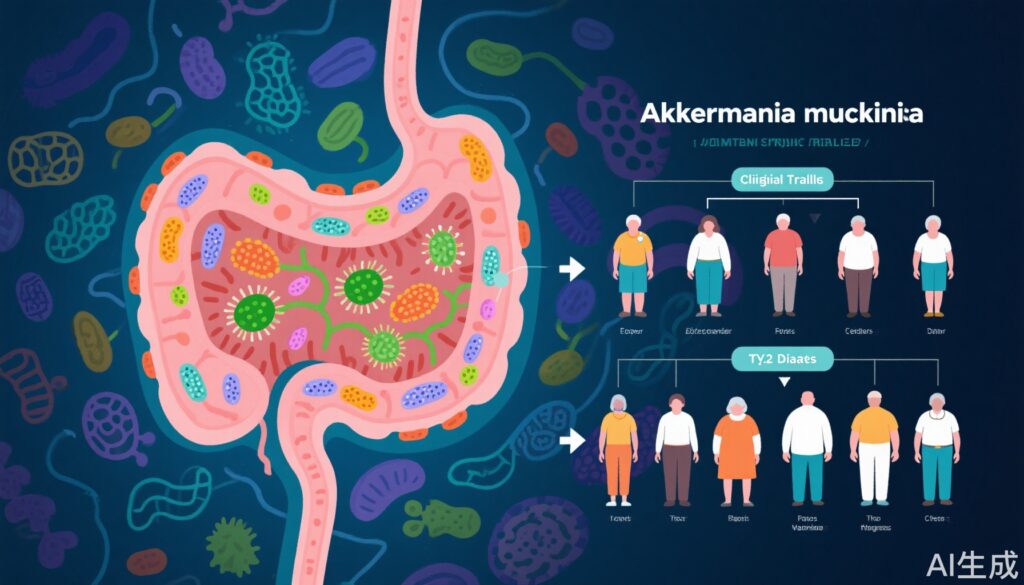Highlights
- Metabolic benefit from Akkermansia muciniphila supplementation in overweight/obese type 2 diabetes (T2D) is dependent on baseline intestinal abundance of the bacterium.
- Individuals with low baseline A. muciniphila show significant improvements in weight, fat mass, and glycemic control after supplementation, while those with high baseline levels do not.
- Study underscores the potential of personalized, microbiota-guided probiotic interventions for metabolic diseases.
Study Background and Disease Burden
Type 2 diabetes (T2D) and obesity are global health crises, frequently coexisting and compounding cardiovascular, renal, and metabolic risks. Despite advances in pharmacotherapy and lifestyle interventions, many patients fail to achieve optimal metabolic control, underlining the need for novel adjunctive strategies. The gut microbiota has emerged as a promising therapeutic frontier, with specific taxa implicated in obesity, insulin resistance, and inflammation. Among these, Akkermansia muciniphila—a mucin-degrading, Gram-negative anaerobe—has garnered attention due to its inverse association with obesity, metabolic dysfunction, and impaired gut barrier function.
Akkermansia muciniphila: Mechanisms and Health Implications
A. muciniphila constitutes 1-4% of the healthy human gut microbiota and is known for degrading mucin in the intestinal mucus layer, thereby maintaining mucosal integrity and modulating host metabolism. Preclinical studies have demonstrated that A. muciniphila supplementation can improve insulin sensitivity, reduce adiposity, and attenuate chronic inflammation in rodent models of obesity and diabetes. Mechanistically, its effects are attributed to:
- Enhanced gut barrier function, reducing metabolic endotoxemia.
- Production of beneficial metabolites like short-chain fatty acids (SCFAs).
- Modulation of host immune responses and lipid metabolism.
Recent data suggest that low A. muciniphila abundance is a marker of metabolic derangement, and its restoration may offer therapeutic benefit. However, human evidence remains sparse and inconsistent, necessitating well-designed clinical trials.
Study Design
Zhang et al. (2025) conducted a 12-week, randomized, double-blind, placebo-controlled trial (NCT04797442) involving 58 adults with overweight or obese T2D. Participants were randomized to receive either A. muciniphila (AKK-WST01 strain) supplementation or placebo, alongside standard lifestyle advice. Key elements of the study design included:
- Population: Adults with BMI ≥25 kg/m² and diagnosed T2D.
- Intervention: Oral AKK-WST01 supplementation.
- Comparator: Placebo capsules.
- Endpoints: Primary—changes in body weight and HbA1c. Secondary—fat mass, gut microbiota composition, and safety.
Baseline A. muciniphila levels were assessed, enabling stratification of participants into low and high abundance groups.
Key Findings
Both treatment and placebo groups experienced modest reductions in body weight and HbA1c over 12 weeks, reflecting the impact of lifestyle advice. However, stratified analysis revealed striking group differences:
- Low Baseline A. muciniphila:
- High colonization efficiency with AKK-WST01.
- Significant reductions in body weight, fat mass, and HbA1c compared to baseline (all p<0.05).
- These benefits were not observed in placebo recipients with similarly low baseline levels.
- High Baseline A. muciniphila:
- Poor colonization after AKK-WST01 supplementation.
- No significant improvements in metabolic endpoints versus placebo.
- Translational validation: Germ-free mice colonized with feces from low- and high-baseline A. muciniphila patients recapitulated the human findings, strengthening causal inference.
- Safety: Supplementation was well-tolerated with no serious adverse events.
The authors conclude that metabolic efficacy of A. muciniphila supplementation is contingent on its initial abundance in the host gut microbiome. This finding supports the emerging paradigm of microbiota-guided, precision probiotic use in metabolic disease.
Expanded Health Knowledge: Akkermansia muciniphila and Probiotic Potential
Beyond T2D and obesity, A. muciniphila’s favorable effects have been explored in conditions such as nonalcoholic fatty liver disease (NAFLD), inflammatory bowel disease (IBD), and aging. Dietary patterns rich in polyphenols (e.g., cranberries, grapes), prebiotics (inulin, oligofructose), and certain fibers can promote endogenous A. muciniphila growth. However, direct supplementation with live or pasteurized A. muciniphila is an emerging area, with early evidence suggesting that pasteurized forms may retain or even enhance metabolic benefits.
Key takeaways for clinical and public health practice:
- Not all individuals will benefit equally from A. muciniphila supplementation; baseline microbiota profiling is advisable.
- Dietary and lifestyle measures that support mucin layer health and microbial diversity may synergize with probiotic interventions.
- Regulatory, manufacturing, and safety considerations for next-generation probiotics (including A. muciniphila) remain under ongoing investigation.
Expert Commentary
This study highlights the complexity of host-microbiota interactions and underscores the necessity for personalized approaches in microbial therapeutics. As Dr. Patrice D. Cani, a leading expert in the field, notes: “The future of metabolic disease management will likely involve microbiome profiling to target therapies to those most likely to benefit.”
Limitations include the modest sample size, relatively short intervention duration, and lack of long-term follow-up. Additionally, the study did not assess functional microbiome changes or host mucosal responses in detail. Generalizability to non-obese T2D populations or other ethnic groups also warrants further research.
Conclusion
Akkermansia muciniphila represents a promising, targeted adjunct in the management of obesity and type 2 diabetes—particularly for those with low endogenous levels. The findings advocate for a shift from one-size-fits-all probiotic supplementation to personalized, microbiota-guided strategies. Future studies should clarify optimal dosing, long-term safety, and integration with established therapies.
References
1. Zhang Y, Liu R, Chen Y, Cao Z, Liu C, Bao R, Wang Y, Huang S, Pan S, Qin L, Wang J, Ning G, Wang W. Akkermansia muciniphila supplementation in patients with overweight/obese type 2 diabetes: Efficacy depends on its baseline levels in the gut. Cell Metab. 2025 Mar 4;37(3):592-605.e6. doi: 10.1016/j.cmet.2024.12.010. Epub 2025 Jan 28. PMID: 39879980.
2. Cani PD, de Vos WM. Next-Generation Beneficial Microbes: The Case of Akkermansia muciniphila. Front Microbiol. 2017;8:1765.
3. Dao MC, Everard A, Aron-Wisnewsky J, et al. Akkermansia muciniphila and improved metabolic health during a dietary intervention in obesity: relationship with gut microbiome richness and ecology. Gut. 2016;65(3):426-436.
4. Depommier C, Everard A, Druart C, et al. Supplementation with Akkermansia muciniphila in overweight and obese human volunteers: a proof-of-concept exploratory study. Nat Med. 2019;25(7):1096-1103.



